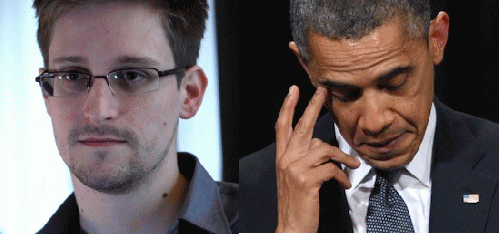Everybody's talking about Snowden, his revelations and their significance. The talk, predictably, is contentious and divided. But government officials and their subservients in the mainstream media aren't participating in a debate; they are attempting to avoid one. The amount of distracting, disingenuous, and disnformative noise sparked by this story would drown out any serious debate.
Government officials and press pundits have already convicted young Snowden of treason because he's "aided the enemy" by damaging our surveillance capability. Some confused (and perhaps frightened) "opinion givers" have walked a thin (and not very straight) line by supporting his whistling on U.S. surveillance but sharply, and nonsensically, denouncing his "revelations" on U.S. spying on China. A chorus of bloggers, talk-show guests, and pundits routinely toss up nasty, personal insults about Snowden's education, girlfriend, se xuality, and courage.
The Hero and the President: Who's the Target? by Google
In supporting this illogical contention, Obama reps are claiming PRISM has been effective in preventing terrorism but nobody can say how. In a Monday night interview, the President told Charlie Rose: "...you've got a guy like Najibullah Zazi, who was driving cross-country trying to blow up a New York subway system." This is one of the main arguments being used to defend the NSA but it's totally bogus. As the Associated Press reported Zazi, now a convicted terrorist, was discovered when British intelligence seized his computer and found an email that revealed his plot. That's why the President was careful not to directly state that there was a connection. "In using Zazi to defend the surveillance program," AP reporters Matt Apuzzo and Adam Goldman wrote, "government officials have further confused things by misstating key details about the plot." From President Obama's carefully worded statement, it's clear he's very conscious of the confusion he's creating; it's his plan.
But why? What is the purpose of this forged confusion? It's to hide the most important truth: we, the people of the United States, are the real target of this surveillance and the surveillance is part of a long-term strategy of control.
The President's insistence that no citizens of this country are "targeted" by the on-line snooping is now accompanied by a soberly-toned assurance that this is a "conversation" we need to have. But without Snowden's revelations we would never have had a conversation because the government lied about these programs' existence. Not even a week before the explosion of information about surveillance, National Security chief James Clapper told the Congress that no Americans were ever spied on. He had to squirm a few days later when asked by reporters to explain his bald-faced falsehood.
First off, talking about "targeting" on the Internet is absurd. The Internet is borderless -- that's its power and purpose. You simply can't write an email confident that it won't be read by someone overseas. Even if you're not writing to such a person, the email can be forwarded or read by someone who is corresponding internationally. By the same token, there is no way you can prevent receiving an email from someone from another country. Once you are receiving email from overseas, you can be picked up by PRISM and you don't know if you'll then be part of an investigation because you don't know who is being investigated.
The "no Americans targeted" spin has another purpose: to de-emphasize the fact that all Internet information is being gathered. As journalist Glen Greenwald made clear in a piece published in early May, the only reason for the construction of the NSA's new data facility in Utah is to grab all information on the Internet -- you need to do that to make such a huge installation cost-effective.
The infamous "PRISM" program isn't a data-gathering program; it's a filtering program. Data gathering is done by larger programs that pull everything. Bloomberg's Michael Riley reported that the government routinely swaps information with thousands of companies in exchange for favors. These "trusted partners" (as they're called) can deliver the entire Internet to the government by using off-shore servers and special agreements between them and other government branches (like the military). In that way, they don't have to go to court for the data.
There is now no question that all Internet data is subject to collection and much of it is being stored. Obama's defense is that only a small percentage of it is being looked at by the NSA, as he told Rose, and all the stored information (which includes all email, video, photos, and message-board posts) can only be examined by NSA after an order from the Foreign Intelligence Surveillance Act (FISA) court.
More nonsense. Since much of this data comes from other government agencies (not related to NSA investigations), it can be examined without a judge hearing about it. Besides, FISA proceedings and orders are completely secret. In the Monday-night interview, Charlie Rose asked the President if any such requests had been turned down by FISA. "First of all Charlie, the number of requests are surprisingly small," the President answered. During its entire history the FISA court has turned down 11 requests out of more than 33,000. That's a bizarre definition of "surprisingly small".
We also now know that Verizon gives the government records of all phone calls -- people, places, and times -- under a court order so secret the telephone giant can't even confirm it. We don't know how long this has been going on (since Verizon is legally gagged) but it's probably several years. To nobody's surprise, the government won't say if other phone companies are involved but logic says that most, including cell-phone companies, are. You don't take Verizon to court and ignore the rest. The Administration's assurance: only a small percentage of calls are actually listened to.
Well, maybe... for now. But who is to say what will happen next year or in five years? How can you be sure that a completely legal communication won't become part of some future investigation as political and legal environments shift? The point isn't what they do with the stuff; it's that they are capturing it. Because this isn't about evidence; it's about privacy. And privacy is the major victim of the entire attack, making this an attack on U.S. citizens.
The army of politicians and pundits has framed the privacy issue in a frivolous way. Given the dangers of the world -- their argument goes -- is your right to talk to your friends, shop, or read texts without surveillance more important than protecting your life?
That kind of personal privacy is important and is, in fact, part of the protection of your life. But it isn't the main issue. In the Constitution, privacy goes hand in hand with the "right of petition" -- the right to demonstrate, organize, and speak out against the government and its policies. You have the right to meet, plan, and organize without having the government looking over your shoulder (or tracking your calls and stealing your email) because all power in the government's hands can and eventually will be abused in the absence of strong "checks and balances".
(Note: You can view every article as one long page if you sign up as an Advocate Member, or higher).






